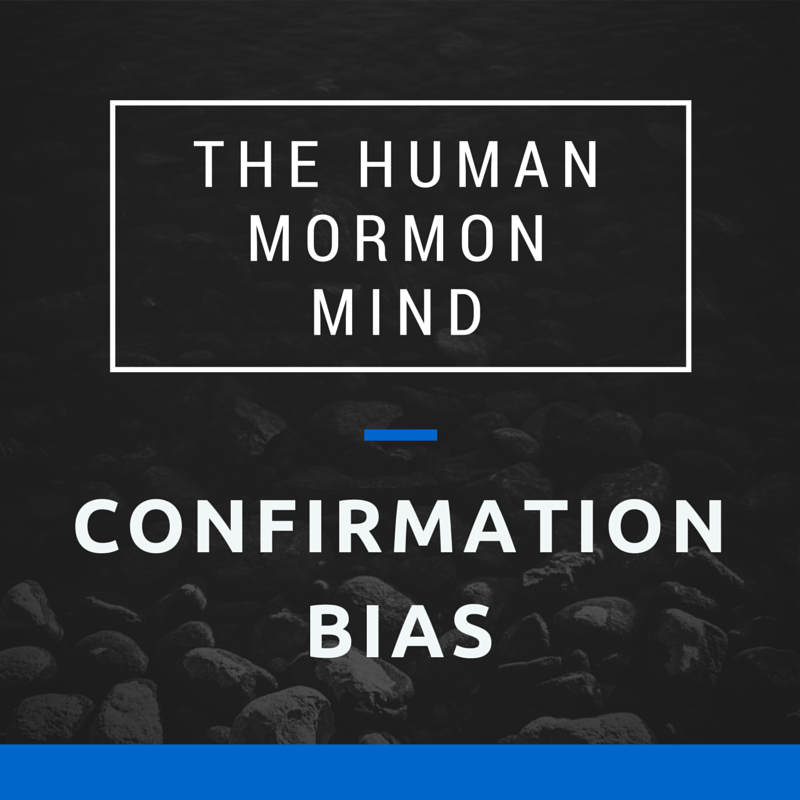Podcast: Play in new window | Download
Subscribe: Apple Podcasts |
Continuing our series “The Human Mormon Mind,” we had the chance to gather a wonderful panel, consisting of Brian Dillman, Laurel Sandberg-Armstrong, Brian Kissell, and Paul Barker in order to discuss the topic of confirmation bias. We discuss the bias in a general way and go into detail on the many instances that we Mormons exhibit this way of thinking.
You are Not So Smart by David McRaney
TEDTalk by Tyler Cowen on simple stories
Share This Post! Because Sharing Really is Caring!

Brian Kissell has a deep love for Mormon podcasts, as they have been an extremely influential tool for him as he has traveled on this wonderful faith journey within the Mormon World. He believes in big tent Mormonism, and is interested in recognizing better ways to value and increase diversity, while simultaneously increasing our ability as a culture for differing individuals to talk to each other in more productive and healthy ways.
Brian is also the host of a few other podcasts. One of these is a short faithful devotional podcast centered around Mormon quotes which can be found at Mormonquotes.wordpress.com. Another is a psychology podcast which can be found at Methodologyforpsychology.org.
All posts by Brian Kissell





So, the different studies at the beginning confused me as to purpose. Let me rehash what I think the points were:
1) Guessing patterns of numbers. When experimentee guessed the numbers that he thought represented the correct pattern, and kept getting the answers right, it confirmed that he was finding the correct patters. But, if the experimentee guessed a pattern that he thought would disapprove what he thought was the right pattern, it would often actually disprove his pattern. Thus it is important to look at “negative evidence.”
2)The adoptive family. I didn’t get this one at all. A positive question is asked, “Who should get the kid?” Everyone answers, “The parents that are home all the time.” Second question, “Who should not get the kid?” Everyone answers, “The parents who are away all the time.” I don’t get what this shows.
3)The librarian/real estate agent. Those that picked that she was suited for a librarian had a harder time later seeing her as a real estate agent and vis versa. This one makes sense.
Michael,
Thank you Michael.
Let me try to explain the custody example. Parent A is average, while parent B has good and bad qualities. Those deciding look for evidence to support the the question they are looking into. When asked who could get custody, they focus on the good qualities and give custody to parent B. When asked who should be denied custody, they focus on the negative qualities of parent B thus giving custody to parent A. It is interesting because the decision of the custody changes simply by looking at the problem in a different way. Does it make more sense now?
The purpose I was trying to get at was simply to demonstrate that we are creatures that seek to confirm, even when seeking to disconfirm would probably be a better strategy.
I did have to think a bit listening to this podcast, but the topic was covered well and I enjoyed it. Thanks for the series.
Great discussion! I was appreciative of the points that noted that cognitive biases affect everyone, not just those who profess religious belief. In particular, I was thinking of the theory of cognitive dissonance. I have seen a number of ex-Mormons claim that those of the “TBM” ilk retain a deluded belief in the church because, otherwise, their years of church service and attendance would cause considerable dissonance. This, in some cases may be true, but it could equally apply to someone who leaves the church. Dissonance arises anytime an individual feels that her/his behavior is inconsistent with her/his beliefs, thus, dissonance reduction is achieved either by changing one’s belief, or changing one’s behavior. Theoretically then, someone who disobeys the proscriptions of the church can either stop the behavior, or they can stop believing that church has any moral authority. Nonetheless, I think it is unfair, and too psychologically reductionist, to attribute either staying in the church or leaving the church to C.D. Rather, I think that podcasts like this are helpful to realize that it is part of the human condition to have biased cognition and hopefully that will help us be more humble in the way we see conflicting views of the world.
I just really enjoyed this podcast. I particularly appreciated the discussion about the zealous who bring a binary, black or white world view to how they view truth. These folks are almost pathological with their confirmation bias. i.e.– It either has to be everything it claims to be or it is a big hoax.
It is always interesting to me that those with that worldview tend to be the most dutiful, diligent, zealous members. However, I have seen those kinds of members all too often paint themselves in to an impossible corner of literal belief. They sustain that worldview by sinking progressively deeper into a fundamentalist bubble that places beyond the real of most of their LDS peers, or they suffer a faith crisis breakdown and zealously join the church of ex-mormonism. often applying the same level of zeal to their non-mormonism as they once did to their mormonism.
Thank you for a balanced, nuanced treatment of this topic.